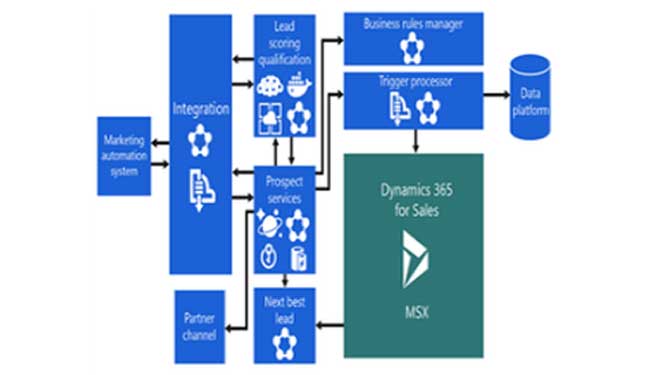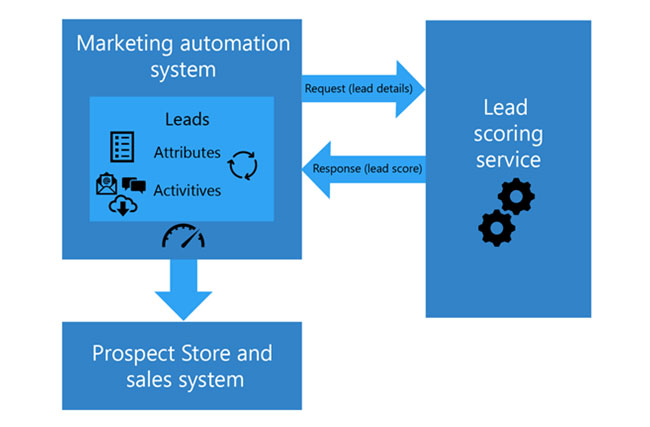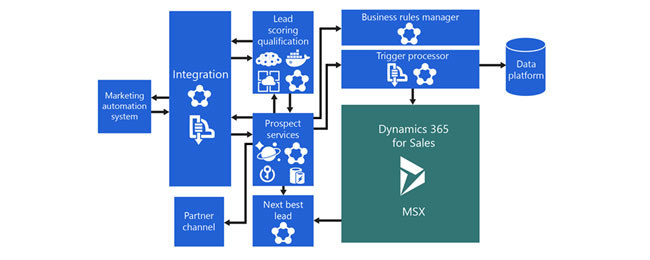How to Increase the Efficiency of the Sales with Dynamics 365 and Microsoft AI
by May 04, 2021

You can now use Dynamics 365 for Sales and Microsoft AI are used to provide the best quality leads to your sales teams. Using this, the sales will be able to interact with qualified leads which have a higher probability of closing. The solution creates a simple, intelligent system for discovering and contacting the best leads and makes the sales teams more efficient and effective.
Finding high-quality sales leads
You may be collecting leads from multiple channels like
- The website contacts us form.
- Product downloads, services, and subscriptions for products.
- Events registrations.
- Content downloads.
When someone interacts with your company by any of the above channels, the person or business becomes a lead either for sales or for marketing purposes. These contact details—become records in the CRM. The salesperson takes the lead received from the CRM and works to convert the prospect into one who’s ready to buy your products or services.
Building lead qualification
For an organization that sells a product or service, they want the lead qualification process to be as effective as possible so that they can create a solid pipeline of leads that can be converted into customers.
By using Dynamics 365 Sales, a business process can be configured to manage the lead qualification process. This process will ensure:
- The lead information to ensure that each lead had valid contact information.
- Nurture the lead using AI and email bot to determine the intent of the lead.
- Move the lead to an identified sales opportunity and finally, move the lead to a sales win and to customer success.
Figure 1. The process of building lead management for sellers.

Why high quality leads are needed?
Even though this is a simple effective process that disqualified poor leads this can be further improved to provide the best leads to the sales team for higher conversion. Many companies have the pain point that their conversion number isn’t high enough and the reason is that the lead isn’t just ready to buy. This was because of the following:
- Limited capacity: The salespeople just don’t have enough time to follow up with everyone on their list. Most of the time they are following up with leads that are nowhere close to the buying stage.
- Massive volume: Sometimes the sellers are presented with a very high volume of leads (real estate, credit cards, personal loans, gym memberships, car dealers, etc.) each day and they are told to contact them all. But most of them might be low-quality leads and not ready to become customers yet and some of them are ready.
- Missing information: The leads that are passed to the sales teams stiff have missing details even if they are qualified by the marketing team. The salespeople might not know the source campaign, the lead score, the previous conversation. So, they have to judge which is the best from the list they get and this is being done without having complete context.
According to a Microsoft study, they found out that 18 percent of the leads converted to customers. This number needs to be increased and the sellers needed the very best leads to so they could convert those leads to customers.
Who is the next best lead?
A good CRM solution should be able to give our sales team simple, actionable access to the next lead in the system that provided the highest probability to close. How can this be done?
- Using the lead scoring and qualification solution using a bot increased the internal conversion for Microsoft from 4 percent to 18 percent.
- Create a simple and clear action for the sellers. This can be done by eliminating long tedious tasks and unnecessary long customer journeys.
Creating better lead ranking with AI-based lead scoring
Using Dynamics 365 lead scoring engine we get more accurate and relevant rankings for the existing leads in the system. The lead scoring pipeline takes these leads from the system and using an API pushes the leads through machine learning models hosted in Azure and returns them back to the CRM with a lead score. The lead scoring solution examines over 200 data points within the context of the lead, including:
Personal information:
- Valid phone number
- Quality of the phone number entry
- Valid email address
- Type of email address—work, educational, personal
- Valid contact name
Firmographics and demographics:
- Industry the lead belongs to
- Size of the company
- Contacts job title and seniority (such as manager or C-level)
Product and service requirements:
- Product interested in
- Product trial downloaded or not
Marketing interactions:
- The amount of time lead was in the CRM.
- Previous and date of last interaction
- Frequency of the interactions
- Source campaign
The process to get the right lead is as follows:
- The model runs several machine learning algorithms to examine these data points and assigns a numeric score to the lead.
- As the data changes, the model continually reexamines and rescores the leads to provide the most accurate and current results.
- The solution uses the model score to determine whether the lead is ready to move to the next stage in the lead qualification process.
- The lead management process sorts the leads by prioritization score and forwards those meeting the scoring threshold to the next level of the lead routing process.

Matching leads to sales teams via business rules
Business rules can be created that uses specific policies to match leads with sellers.
Business rule policies can contain numerous rules and conditions so a customer won’t be contacted outside of normal business hours or too frequently. Policies are based on lead and seller data, including:
- Calling hours based on region
- Call frequency
- The amount of time between calls
- Language
Finding the next best lead via the Prospect Store
The Prospect Store provides the filtering functionality that determines which specific leads will the solution presents to sellers. The business rules manager runs the leads—which the lead scoring engine has already accurately scored—for each seller and surfaces those leads through Microsoft Sales Experience (MSX).
Benefits
- Better use of real-time lead scoring based on lead actions.
- Differentiate between partners.
- Lead segmentation.
- Increased lead conversion. With the new lead management solution, Microsoft has increased its conversion rate from 18 percent to 56 percent.

Best practices
- Start small. Run a pilot with a small set of sales teams to help ensure that the solution fulfills all the requirements.
- Understand your data. It’s been critical for us to understand the state and quality of our lead data to help ensure the accuracy of our machine learning models and lead management mechanisms.
- Enrich your data. Enriched data leads to a better context for machine learning and AI processes, which results in greater accuracy.
- Know your sellers. Lead management is all about providing our sellers with leads that are most likely to turn into customers. That means matching leads with sellers that speak their language, understand their business needs, and have expertise in the products that the customer is interested in.






